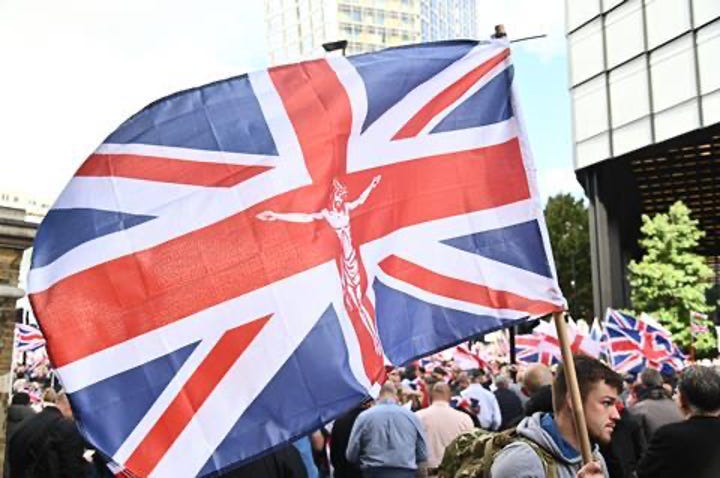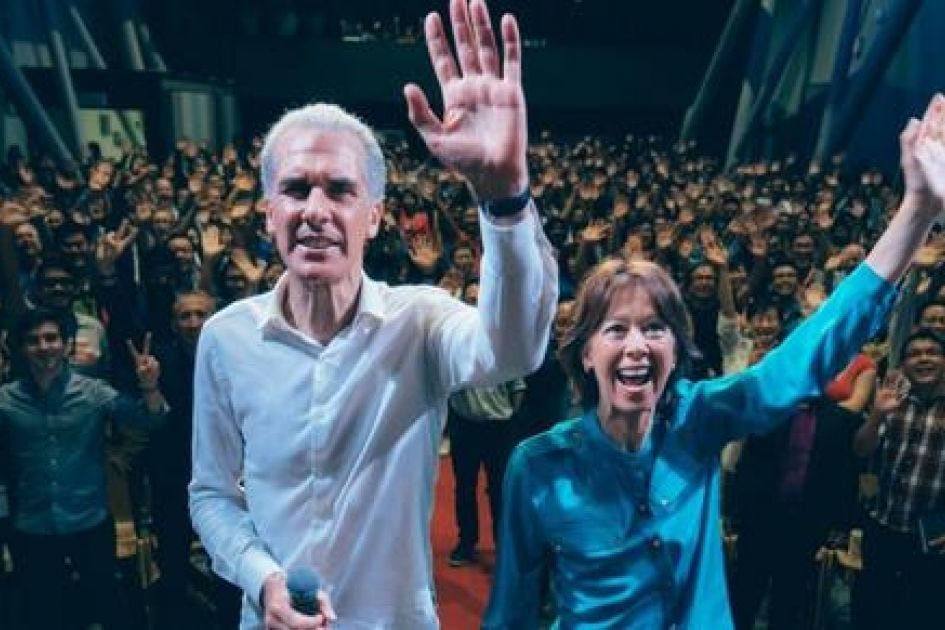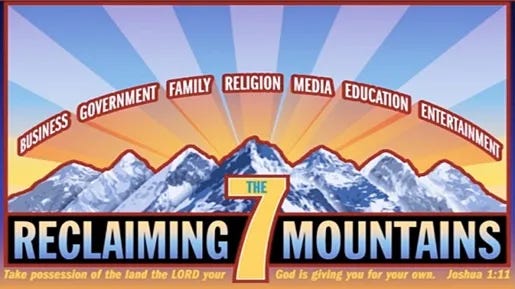Charismatic Christian nationalism in the UK
God's on the move in Britain, and carrying a pitchfork
The most unlikely story of 2025 is the return of Christian nationalism to the UK, usually considered a very secular country. Here’s the story of my 18 turbulent months as a charismatic Christian, 13 years ago, at the Anglican mega-church now at the heart of the UK revival, and what this all has to with Mumford and Sons. In the article I explain why I ultimately decided I wasn’t a Christian, and my fears about the rise of Christian nationalism in the UK.
13 years ago, I was standing on a stage in a packed church, in front of 500 believers, next to the most famous Christian preacher in Britain, Nicky Gumbel. ‘So, Jules,’ he says, ‘what difference has Jesus made to your life?’
What was I going to tell the audience, I wondered? And how did I end up here?
My journey to Jesus (and back again) started in 2012. I’d just published my first and most successful book, Philosophy for Life and other Dangerous Situations, which is a hymn to Stoic philosophy. But I’d already realized the limits of Stoicism - it was too rational, too individualistic. A friend connected me to the Alpha Course, a famous course in evangelical Christianity run by a church called Holy Trinity Brompton (HTB) in west London, so, thirteen years ago, I went along – partly for research, and partly out of genuine spiritual curiosity.
There is a kind of self-consciousness the average English person now feels about going to church, more than if one went to a yoga session or Vipassana retreat. As the sceptic psychologist Richard Wiseman put it: ‘Being a Christian used to be shorthand for being good. Now it’s shorthand for being odd.’ In 2013, the UK became a post-Christian nation, with the majority now subscribing to no religion. There’s been a cataclysmic decline in church attendance since the 1960s, particularly in the last decade – only 750,000 people go to church on Sundays, less than 2 per cent of the population. The Anglican Church appeared to be heading for extinction in England (although it’s booming in Africa). But something is shifting – there’s talk of a ‘quiet revival’, particularly among Generation Z. A survey commissioned by the Bible Society found a quadrupling of church attendance by young adults, from 4% in 2018 to 16% now. The kids are reading Jordan Peterson, listening to Candace Owens, mourning Charlie Kirk, voting for Reform, and doing the Alpha course.
As I approached HTB in South Kensington, back in 2012, I joined a long line of people queuing to sign up for the Alpha Course, mainly well-dressed people in their 20s and 30s. We were registered by a team of young volunteers, radiating positivity and wholesomeness, and divided into 40 or so groups. The groups of ten to 15 people sat in circles around the church, eating the free lasagne and introducing themselves.
I was in a group with Nicky Gumbel, who was vicar at HTB until 2023, and is probably the most famous living evangelical in the UK. Nicky is a 70-year-old Etonian ex-barrister, grey-haired, charming, full of enthusiasm. He says ‘amazing’ a lot, like everyone else in the church. When he speaks to you, Nicky fixes you with a sort of Aslan-esque focus, as if he sees your potential role in the Great War. It’s flattering, you feel eager to sign up. He often mentions HTB’s vision: ‘the re-evangelisation of the nations, the revitalisation of the Church, and the transformation of society’. It seemed a doomed mission in a country where church congregations are flat-lining, but if there’s one church where it seems possible, it’s HTB.
To date, the Alpha course has been taken by more than 30 million people in 169 countries. Hundreds of thousands have watched the Alpha videos, which feature a shirtless Bear Grylls (a member of HTB’s extended congregation, he converted Russell Brand to Christianity). Nicky’s Bible app, Bible In One Year, has been downloaded more than a million times. In London, HTB attracts a Sunday congregation of 4,000 people, across ten services and four sites, and it has played an important role in making London the one English diocese in which the Church is growing. HTB curates have ventured forth like missionaries and opened at least 30 ‘church plants’ from Birmingham to Brighton. It helps that HTB’s congregants include several millionaires and billionaires, who give it 10% of their earnings. To quote journalist Andrew Graystone: ‘HTB is already by some distance the richest parish church in the UK. It has a budget of around £10m a year and a staff of 118, making it larger than several Church of England dioceses. Most parishes in the Church of England struggle to afford a curate. HTB has 28.’
HTB’s influence spreads far and wide – Justin Welby, former Archbishop of Canterbury, came from the HTB congregation; Tony Blair spoke at HTB’s leadership conference; David Cameron praised Alpha in his special Easter message; Charlie Mackesey, author of the bestselling The Boy, the Mole, the Fox and the Horse, is a beloved preacher there. Various celebrities have done Alpha, from Spice girl Geri Halliwell to footballer Olivier Giroud. Paul Marshall, the billionaire owner of GB News, the Spectator and Unherd, is on the board of HTB. Philippa Stroud, organizer of the Alliance for Responsible Citizenship, goes to an HTB-planted church. Danny Kruger MP, possibly a senior figure in a future Reform UK government, also attends an HTB spin-off church.
This is a well-connected, well-funded, highly efficient machine for religious conversion. And they genuinely, passionately, ecstatically believe they can turn the tide on England’s secularisation.
Alpha Force
After we introduced ourselves and ate our lasagne, the band started to play. We rose for a couple of hymns, singing the words as they appeared on the video screens. It was at this point that I realised something had changed in the Church of England. Gone were the old Victorian hymns and the wheezy organs, to be replaced by rock bands and Coldplay-esque anthems. The audience waved their hands in the air with their eyes closed while the disco lights swept over their ecstatic faces.
Then Nicky Gumbel bounded on stage to welcome us to Alpha and assure us HTB is not a cult and we won’t be harassed if we decide to leave. He clearly recognised how alienated most young British people are from the Church, and he was eager to show that it’s not weird. Alpha talks are filled with reassuring references to pop culture – Russell Brand and Freddie Mercury are quoted, and we’re told Elton John, Madonna and Jennifer Lopez all wear crosses. The theology is straightforward: Christ died for us and was resurrected, and His sacrifice liberated us from sin and death and gave us new life. We can have a personal relationship with Jesus by letting the Holy Spirit into our hearts. The great intellectual challenges Christianity faced over the last 250 years – evolution, Biblical criticism – are brushed aside. ‘Science tells us how, but it doesn’t tell us why,’ said Nicky. Besides, there is a difference between ‘head knowledge’ and ‘heart knowledge’. The most important thing is not conceptual logic, but relationships – our relationship with God, our relationship with each other.
The Alpha course runs for 10 sessions. Each Wednesday evening, after the worship and the 20-minute Alpha talks, we’d go into our ‘small groups’ to discuss the ideas we’d heard. In our group, Nicky, Pippa and Jack sat back and let the rest of us discuss the topic among ourselves, even when we raged against God and Christians. Gradually, over the ten sessions, people started to open up about their own lives, their setbacks, their longing for God and community. It was a profoundly cathartic and bonding experience to meet regularly with the same group of strangers – people of different ages, nationalities and races – and be honest and vulnerable about what matters to you.
Humans’ need to serve
Nicky Gumbel has said that modern society doesn’t always meet our core needs – we need meaning, we need love, and we need belonging. The Alpha course gives lonely urban individualists a taste of having those needs met. What if there was a God and He loved us? What if the creator of the universe had a special concern for us, even at our worst? What if that love was free? We could let go of our fear, our shame, our inhibitions, our sense that we’re not well and have to hide it to avoid others’ rejection. We could stop trying to prove our importance to the world. We could relax and expand in God’s love, like a sponge in a warm bath. This is what Alpha tries to teach: the Jesus cure. God’s love will cure you of your shame, your addictions, your hang-ups, your desperate striving for the world’s approval. Your Alpha group will love and accept you. The wider community of HTB will love you too, particularly if you’re a ‘seeker’. You are the prodigal son (or fatted calf), whose return to God is celebrated by the saints and angels. You will never be higher status than as a seeker on the Alpha course.
What Alpha gets – and what Christianity in general nourishes – is humans’ deep need to serve something greater than them, greater than their career, greater than their social media following, greater even than their family. Gumbel said in an interview last week:
The greatest title you can have is ‘servant of the Lord’…The greatest act of service is introducing someone to Jesus... The big heroes aren’t going to be the people who are known, but those who quietly went along and just served Jesus.
Appealing to humans’ deep need for heroic self-sacrifice can unlock extraordinary powers within people – extraordinary energy, motivation, generosity, endurance of suffering, maybe even supernatural powers of healing or telepathy or prophecy. Extraordinary acts of virtue…or fanaticism. Although I no longer consider myself a Christian, for reasons I’ll explain, I still believe in the power of dedicating your life to God, however you make sense of that difficult word. Commitment to a higher power liberates us from the neuroses of the little ego and helps guide us to good things, in my opinion.
In week seven, all the groups went on the ‘Alpha weekend’, staying in a hotel on the coast in West Sussex. Nicky said we would learn how to invite the Holy Spirit into our hearts. The Holy Spirit doesn’t enter unless you invite him. ‘The Lord is a gentleman,’ another pastor explained, meaning that, unlike Zeus, Jesus doesn’t rape you. Nicky explained that the Church had sometimes been suspicious of ‘manifestations of the Holy Spirit’, but they actually have a central role in the Bible, as in the Pentecost episode in the Acts of the Apostles. The Holy Spirit can grant all of us the charismatic power the apostles possessed. To get the fires burning, Nicky said we would pray the oldest prayer in Christianity: Come, Holy Spirit. ‘You might feel a warmth in your chest,’ he said, ‘or a tingling, or your palms might feel a bit sweaty . . . Come, Holy Spirit . . . Come . . . Thank you, Lord . . . Thank you . . . Even now, the Holy Spirit is here, at work in some of you.’ I could hear some people gently sobbing around me. One woman behind me started quietly singing in tongues, like a Mediterranean baby-talk. I opened my eyes and Nicky appeared by my elbow, like a crocodile. ‘Can I pray for you, Jules?’ he asked. I was flattered. ‘Lord, we ask that you fill Jules with your Holy Spirit, and reveal Your amazing plan for his life.’ I opened my eyes and Nicky smiled at me eagerly. ‘How was it?”
A brief history of charismatic Christianity
It’s remarkable that the Church of England should have become so ecstatic today, considering it was established back in the Reformation as a prophylactic against ecstasy. The former Bishop of London, Richard Chartres, tells me that during the Reformation there was a ‘fear of the irrational, a fear of the ungovernable spirit’. This is unsurprising, given some Protestants in the 16th and 17th centuries were using the Holy Spirit as a justification to start violent revolutions. Martin Luther dubbed such ecstatic revolutionaries ‘enthusiasts’, and insisted that it was heretical to claim special gifts or revelations from the Holy Spirit. The Church of England was, from its birth, suspicious of ecstasy – the Holy Spirit was ‘edited out’ of Thomas Cranmer’s 1540 prayer book, according to the Bishop of London.
In the second half of the seventeenth century, after the English Civil War and the Thirty Years War, the rational liberal secular nation-state emerged triumphant and religious ‘enthusiasm’ was deemed a medical illness and threat to public order. Christianity was rationalised: all claims to personal revelation were subject to reason. God became distant, a blind watchmaker or Deist Supreme Ruler, and Christianity became a matter of agreeing with a handful of propositions.
But ecstasy came back into Anglicanism with a vengeance on 24 May 1738, at 8.45 p.m., in Aldersgate Street in London. A pious young Christian called John Wesley felt his heart ‘strangely warmed’ after attending a gathering of ecstatic Protestants called the Moravians. His brother, Charles, had likewise experienced a ‘baptism of the Holy Spirit’ three days before. The Wesleys spread their new vision throughout the Anglican Church, although it later split from Anglicanism and became known as ‘Methodism’.
At Methodism’s heart is the idea that Christians can encounter the Holy Spirit today, and this baptism of the Spirit gives us the assurance that we are saved. Methodists became famous – or infamous – for their highly emotional services, their theatrical sermons, their wonderful hymns and their strenuous evangelism, particularly to the working class. They would organise ‘love-feasts’, where hundreds or even thousands of people would gather for open-air services and ‘camp meetings’, which could go on for hours or days. Attendees wept, fainted, shook, groaned, danced, laughed and leaped for joy as the Holy Spirit descended upon them.
The Holy Spirit spread across the world, and is still spreading, through spectacular revivals. There was the Welsh Methodist revival of the 1730s–50s, in which ‘old men and women leaped around like roe deer’. There was the First Great Awakening of American Christianity in the 1730s and 1740s, and the Second Great Awakening of the early-nineteenth century; and the Third Great Awakening of Pentecostalism, which started in Wales in 1904, spread to Los Angeles in 1905, then swept like wildfire around the world. Around 35,000 convert to Pentecostalism every day.
Then there was the Fourth Great Awakening in the 1960s. Baby-boomers sought intense experiences of all kinds and some of them stumbled across Christianity – specifically the charismatic Christianity found in Methodism and Pentecostalism. A young hippie called Lonnie Frisbee, who would later be rejected by the Church for being gay, encountered Jesus while tripping on LSD. Lonnie started zapping the Holy Spirit to other hippies, who became known as ‘Jesus Freaks’. They gathered at Calvary Chapel in southern California, and later at a network of Californian churches known as the Vineyard, run by a preacher called John Wimber. Wimber taught that, through the power of the Holy Spirit, Christians today could do all the supernatural things that the apostles did in Acts – supernatural healing, supernatural prophecy, even bringing people back from the dead. The Holy Spirit unlocks supernatural powers or ‘gifts’. Hence the phrase ‘charismatic Christianity’ – charismatic means ‘gifited’.
In the 1980s, John Wimber preached at HTB in London. Nicky Gumbel – then an uptight barrister in a three-piece suit – got zapped by the Holy Spirit, and reportedly had to be carried cataleptic out of the church. ‘God is giving that man the ability to tell people about Jesus,’ Wimber said as Nicky’s unconscious body was carried past him. Well, he was right on that score.
The Fifth Great Awakening: Charismatic / Conspiratorial / nationalist Christianity
Another person inspired by Wimber’s Vineyard movement was a theologian called C. Peter Wagner, who started the New Apostolic Reformation in the 1980s. Wagner taught that certain special Christians today are anointed by God as prophets or apostles, and are therefore right up there with the prophets of old - Daniel, Isaiah, St Paul and so on. According to Wagner, the specially-appointed apostles and prophets would lead their churches in spiritual warfare against the demons infesting their neighbourhoods, organisations and societies. It was the job of ‘prayer armies’ to take back dominion over society, neighbourhood by neighbourhood, sector by sector, country by country - this is a doctrine known as Dominionism (although you might as well call it Demonism).
One of the ideas of Dominionism is the ‘Seven Mountains’ ideology, according to which there are seven critical peaks of modern culture—government, business, media, education, entertainment and arts, family, and religion—and Christians should dominate them all and take them back from Satan and his hideous horde. Exorcism as political strategy.
Spiritual warfare fused with culture war and Qanon conspirituality. Any opponents to the conservative traditionalist ideology became seen as demonic. As early as 2011, one apostle from the New Apostolic Reformation declared that the Democratic Party was demonic. Hillary Clinton was demonic, Obama was demonic. The LGBT and trans movements were demonic. Tom Hanks was demonic. Lady GaGa and Beyonce were demonic. Climate activists were demonic. Disney was demonic. Christian nationalists prophesied a Coming Storm, and Qanon tapped into this apocalyptic language.
Donald Trump became an unlikely hero for this ecstatic Christian nationalism, despite his philandering, lying and narcissism. He is a ‘modern day Cyrus’ according to one NAR apostle. He has happily tapped into the NAR’s creed, labelling the Democratic Party ‘demonic’ in the 2024 campaign. And in return, NAR preachers got on board with the Big Lie that the 2020 election was stolen, and told their spirit warriors in the days before the January 6th violent protest that God wanted them to ‘dispel the Kingdom of Darkness’ and reclaim the Capitol from the demonic Dems.
If the charismatics are the Holy Roller revolutionaries, the National Conservatives and Post-Liberals are the bolshevik intellectuals of the Fifth Great Awakening. Often Catholic, like JD Vance and Patrick Deneen, Nat-Cons and Post-Liberals take inspiration from Israeli philosopher Yoram Hazony in his affirmation of faith, family and muscular nationalism and his suspicion of secularism, liberalism and global governance. Both the charismatic populists and the National Conservative intellectuals agree on one thing – Christianity is the one true religion, and governments should actively promote it. We should do away with the liberal secular state and embrace a more explicitly Christian governance model, closer to Orbanism in Hungary or Francoism in Spain.
The MAGA Great Awakening reached a peak in the last few weeks since the martyrdom of Charlie Kirk. At the mass rally held to commemorate his life, president Trump called it a ‘great spiritual awakening’. Tucker Carlson declared he could ‘feel the Holy Spirit humming like a tuning fork’ throughout the stadium. This is explicitly a political Christianity, in which religious ecstasy is weaponised against perceived enemies of the state.
Modern British Christianity was until recently a very different beast. While American politicians are obliged to mention God, in Britain MPs go out of way not to talk about their faith, for fear of looking weird to the UK’s largely secular voters. But that’s beginning to change. Christian nationalism is having an unlikely revival in the UK.
A man on fire
My own conversion to charismatic Christianity happened in June 2013, deep in the Welsh valleys, at a place called Ffald y Brenin. (I’m not a Christian now, and will explain why below).
Since the mid-1990s, strange things have been happening at the Christian retreat centre in Wales – miraculous healing, conversions, prophecies. I drove down for their summer conference, a three-day event in a nearby church. I arrived in time for dinner in the church hall. All the other attendees were over 55. I sat down at a table, feeling a little self-conscious, and asked one of the old ladies what I could expect from the conference. ‘You can expect to be invaded by God!’ she said testily.
After dinner we all drove to a nearby church. Roy Godwin took the mike. He’s a small man, with a tanned balding head, glasses, bad teeth and a quiet voice brimming with absolute certainty. He and his wife Daphne run the Ffald y Brenin retreat centre. Roy spoke of the 1904 Welsh revival, of how the first drops of a new revival were starting to be felt. ‘But we want more. Come on, Lord. Bring it on. We want another revival.’ He told stories of all the miracles that took place at Ffald y Brenin – skin conditions vanished, cancer ‘rebuked’, legs extended (one of charismatic Christians’ favourite miracles is healing people who have one leg shorter than the other). ‘We now expect instant healings,’ he said. ‘This is real.’ He clearly had a very powerful expectation of the supernatural. Indeed, the air was thick with this expectation. The pensioners had come to call God down, like a dove from above. And sure enough God descended upon us, like a UFO. The pensioners laughed and twitched and groaned and even screamed as the Holy Spirit came upon them. The pensioners were convinced they were heroes in a spiritual war to liberate the nations and establish the Kingdom. One of them explained how he had liberated his town from the Enemy by praying outside a New Age bookstore.
For all my intellectual distaste for these scenes, after a while my psycho-mystical-religious side was triggered. By Saturday evening, as the music engulfed me, a thought came into my head that I wanted to serve God rather than my own worldly ambitions. It was a commitment, I guess, an intention. Suddenly, I felt my chest fill with a powerful energy that pushed my head back, further, further, until it almost hurt my neck muscles. It took a real effort to push it forward, then another wave would sweep it back. It was as if painful pleasure was bursting from my chest, so powerful it literally took my breath away. At one point, Roy asked us to close our eyes, then raise our hands if we wanted to renew our commitment to Jesus. At the very back of the church, I raised my hand. The person next to me hugged me and wept. Then we sat down. I shakily went to the toilet to drink some water. I looked at my eyes in the mirror, my pupils were dilated and my stomach was churning slightly. Just like on E, I thought. At the end of the final service, my legs still trembling – indeed, everyone was twitching, like there was a loose wire in the floorboards – I went to thank Roy and Daphne. I hadn’t spoken to them or introduced myself for the whole three days. Roy turned to me immediately and said: ‘God says that you can stand on the outside analysing, but He’s here, waiting for you.’
From ecstasy to agnosticism
For a few months, I was high, convinced by my experience and jubilant about my part in the coming UK revival. But emotional highs die down, if they’re not backed up by good reasons and strong community. The community bit was hard. The Alpha course wants to emphasise the normality of the Church. But, on the inside, you realise how different it is. Charismatic Christianity is its own little subculture in the UK, with very different values and a whole different ontology. I felt like I was playing a role. Maybe I was looking for community rather than God, but I couldn’t pretend to be someone else just to fit in. I felt like someone pretending to be an alcoholic just to hang out at AA.
I tried to intellectually accept Christianity but this proved very hard. I resisted the idea, taught to me at a theology college connected to HTB, that the Bible is an infallible book and so we should accept its pronouncements on, say, homosexuality. I do not love the Bible, I’m ashamed to say. Jesus’ teachings are sometimes sublime. But, judging by the Gospels, Jesus was also clearly a man of His culture, i.e, first-century Jewish apocalypticism. Accept God’s merciful love, or else. To me, it seems that He and his apostles expected the End Times any day, when evil would be utterly vanquished, the dead would rise out of their graves, and a New Jerusalem would appear. But it didn’t. Not yet anyway.
My biggest intellectual stumbling block was my inability to accept that Jesus is the Only Son of God and the Only Way to God, and every other path is wrong and maybe demonic. The Quaker and the New Age Perennialist within me refused to accept that - and that’s why I feel I can no longer call myself a Christian, because accepting Jesus as the Son of God and the One Way to God seems like the minimum requirement for entry into the club.
Alongside the occasionally-fundamentalist sense that Christians are right and everyone else is wrong, one sometimes finds a black-and-white apocalypticism – we’re the good guys with the angels at our back, and if you’re against us, you’re on the wrong side of cosmic history. We side with Aslan and Aragon, you’re with Sauron and the White Witch (and I’m speaking literally – the Christian right loves to portray the radical left as orcs, a nice way of de-humanizing your ideological opponents).
Charismatic Christianity seemed far too certain in its map of the supernatural. I believe in the supernatural and a lot of weird, wonderful and terrifying shit has happened to me in my life, and yes I pray to God and try to follow His will. But charismatics are so confident in their ontological map (God and angels versus Satan and devils) and so confident in their ability to pray away evil, sickness, poverty and suffering. I do not have their certainty. The Book of Job seems to me the most honest book in the Bible – who knows what’s going on up there. But the Book of Job is not really the basis for a successful evangelical movement. For that, you need the terrifying certainty of militant Islam or militant Christianity.
The risk of a demon-haunted apocalyptic world-view is that you start to see anyone who opposes you as demonic. I heard charismatics say the ‘gay lobby’ is demonic. Some suggested Hinduism and Islam were demonic. Others saw the EU as demonic (that’s why so many voted for Brexit). ‘Woke’ is demonic. Trans is demonic. The New Age is demonic. Climate campaigners are demonic (according to Peter Thiel, Greta Thunberg could be the Anti-Christ). Some stricter denominations thought HTB itself was demonic. Once you start looking, you can see little pointy horns jutting out everywhere.
Charismatics are so focused on the demons outside the church, sometimes they miss the darkness within it…and within themselves.
After the paywall, how HTB is at the heart of the Christian nationalist revival in the UK.







